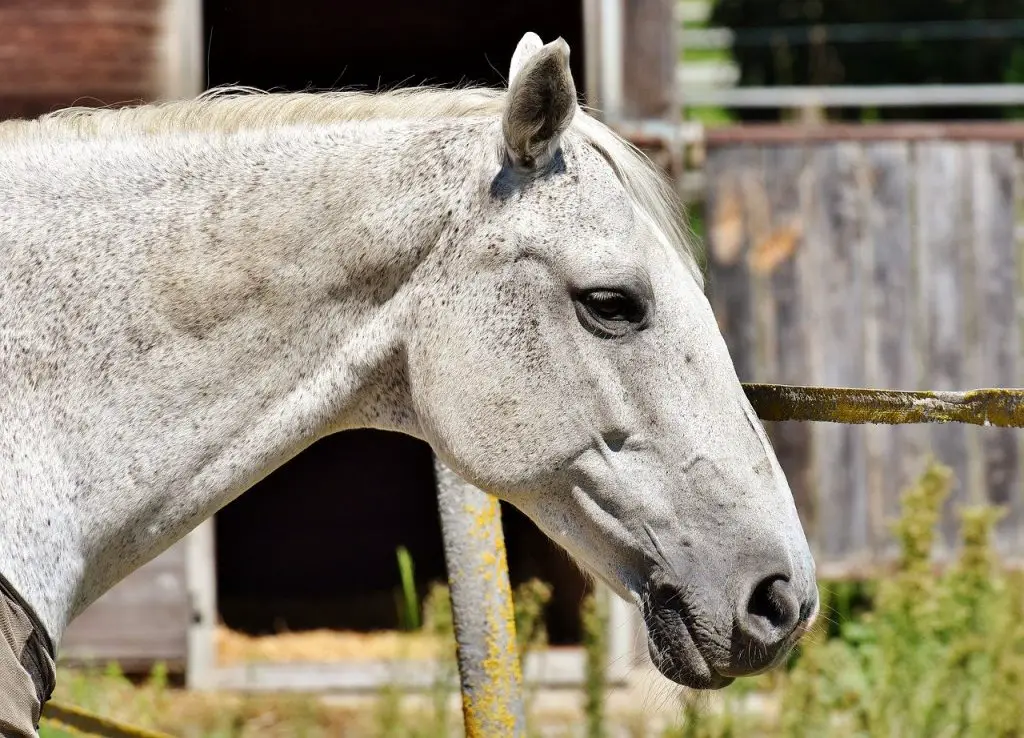Last Updated on February 22, 2022 by Allison Price
There will always be exceptions to every rule. While it is possible for horses to get fleas, it is extremely rare for healthy horses to ever have flea problems. Flea-infested horses are those that have visible signs of being infected. Flea-bitten skin can be described as irritated skin or skin that is swollen from itching. Although some horses may pick up a few fleas during their lifetime, in these cases the fleas are likely to be using the horse more as a stop-off than a host.
Fleas can be transmitted to horses Fleas are not common in horses because they spend less time sitting down. Fleas love hosts who live in dens or nests, so they can have warm environments to breed and lots of victims strong>
How can horses get fleas?
Horses are not susceptible to fleas, but they can be a temporary host for a variety of reasons. Fleas can be opportunistic. They will wait for months without eating before looking for a new host. If your horse is not lucky, he may become the host.
Sometimes it is easier than you might think to make your horse a temporary host. For example, you might have ridden through long grass and a coyote or fox has entered. Although the animal may be gone, flea eggs might have hatched and are now waiting for a new host. They won’t stay with your horse, but they could travel to another four-legged furry friend.
Horses also pick up fleas from other pets in their yard, such as cats or dogs. Many people have at least one cat to keep rodents away or a dog to guard the yard. These can carry up to 20 fleas per day so it is possible for one or two to find their way onto your horse.

Can horses get fleas off cats
Fleas can only live with one species or a group of species. They can only eat certain species, and they cannot reproduce on them. This makes it unlikely that a horse will be bitten by cat fleas or dog fleas. However, if your yard cat is a fervent fan of snuggling on your horse’s back, then fleas from that cat could make their way to your horse.
Don’t be alarmed if this happens. Fleas are specific to the host and won’t lay eggs. Most cases can be removed by brushing your horse’s hair or using your hands. You can wash them off your horse’s coat if you prefer, but make sure to dry it properly.
How do you stop a horse getting fleas?
To prevent your horse getting fleas, it is important to treat the fleas from the source. They can be removed from other animals and will not travel to your horse.
You can prevent them from happening if you are regularly traveling to other yards or competing in yard events. Fleas and flies can be prevented by ensuring your horse has a balanced diet that includes a natural garlic supplement. Flea prevention is also possible by grooming your horse every day.
How can you eliminate horse fleas?
Your horse will be healthy so they won’t get fleas. However, if your horse does pick up fleas from a yard cat, don’t worry as they’ll likely disappear within a few days. However, if you need to eliminate fleas immediately, then a thorough grooming and some repellent are recommended.
You can make your own fly repellent if you prefer to use natural alternatives. Boil a pint of water, then add the whole lemon, sliced and with the rind intact. Let it stand for about 10 hours. Then you can either rub the mixture into your horse’s hair with a sponge or transfer it to a spray container and use it like any other fly repellent. This natural repellent works because the chemical compound d-limonene found in the lemon’s rind is used to repel insects.
Can horse fleas bite humans
Horse fleas are technically not able to bite humans. If your horse has fleas, it’s likely they have come from a cat or dog. They can bite humans.
Flea bites can be very painful and itchy. However, the Centers for Disease Control say that fleas don’t carry any diseases.
Why are horses not affected by fleas?
Fleas are a common problem in fur animals. You might assume that horses have evolved a special coat to repel fleas. Understanding the life cycle of a flea is key to understanding why horses don’t have fleas. An adult flea will bite their host and lay 20 eggs. These eggs can be laid daily. As the host moves, the eggs are scattered around the area where the host lives. They will stay there for two weeks, then develop into larvae and pupae.
The eggs will be able to live in the bedding if the horse is well-behaved. Although you might believe that this is true, fleas have not yet evolved to live on horses permanently. Fleas also don’t need a place to lay eggs, as horses don’t make nests, dens, or setts.
What is the difference between lice, ticks, fleas and mites in your body?
Although some people mistakenly refer to mites, ticks or lice as fleas, they are actually quite different. Yes, they can all bite the skin and cause itching.
Ticks Ixodida
Ticks are closely related to spiders and are host-specific. However, unlike fleas there are some tick species that are horse-specific. Tick bites can cause skin irritation and can also transmit diseases like Lyme disease ( a disease transmitted by ticks, which is a type of arthritis). Horses can become anemic due to their severe blood loss in extreme cases.
Mites (Parasitiformes)
Mites, another relative of the spider can infect horses. They will burrow into their hosts. Mange is a skin condition that can be caused by burrowing. There are two types of mange: ear mange or leg mange. Mange can cause severe pain and even lameness if it affects the horse’s legs.
Fleas – Siphonaptera
Fleas, which are wingless insects, need blood to produce eggs. Fleas have no wings but can jump to get to their host. They are so tall that they could jump over 670ft if they were 6ft in height.
Lice – Phthiraptera
Like fleas, lice can also infect horses. These parasitic insects can be easily transmitted from horse to horse by living in horse hair. One horse with lice must be kept away form other horses. All brushes, halters, rugs, and halters of the other horse must be removed. Lice can cause severe discomfort for horses with lice, making their skin sore. However, they are not believed to transmit any diseases.


